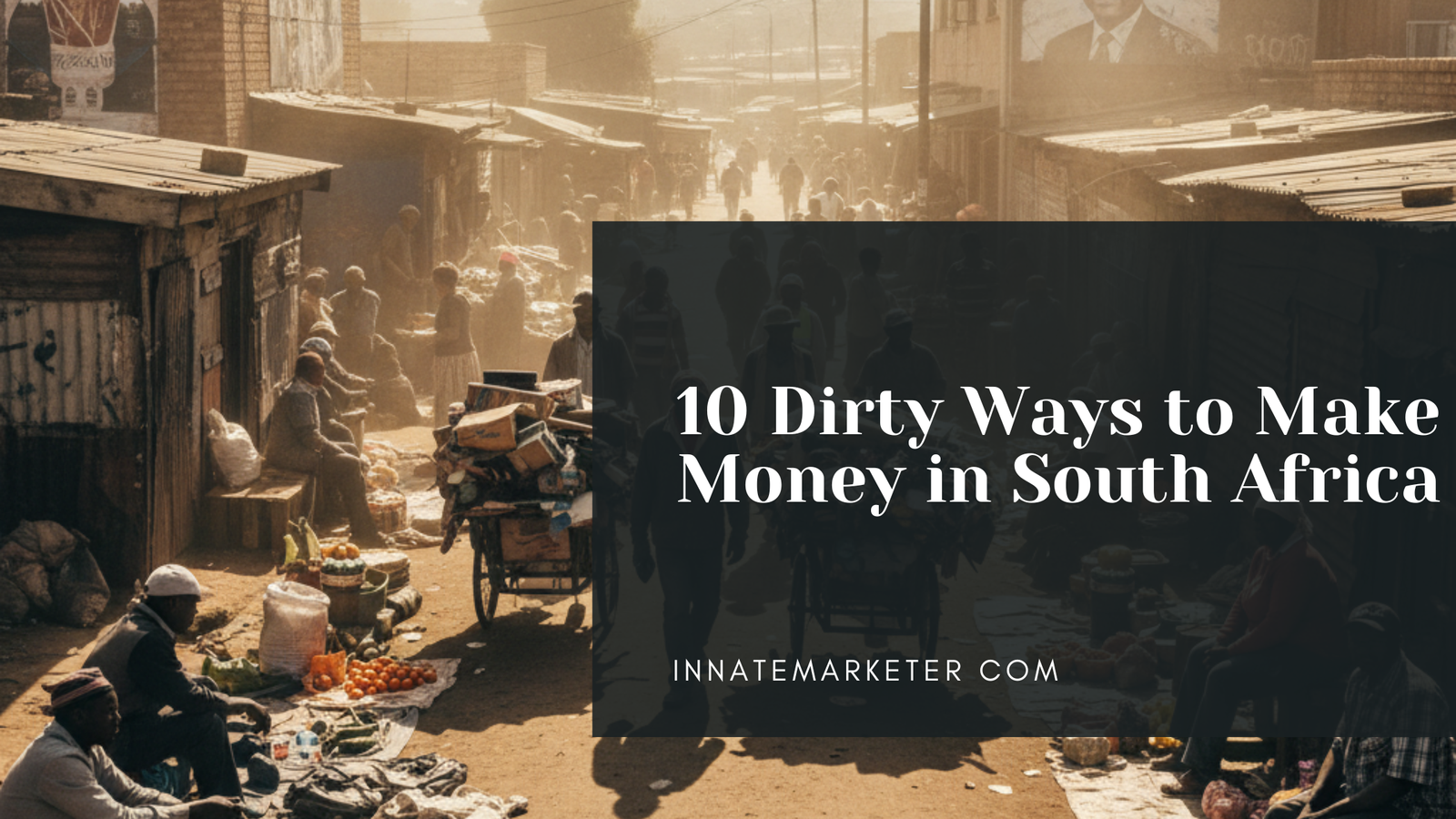Money can be made in many ways. Some methods are clean, traditional, and socially respected. Others are less glamorous, less safe, and often called “dirty ways” to earn. In South Africa, many people turn to these methods because of high unemployment, poverty, and limited access to resources. While these options may bring fast cash, they also carry risks and challenges. This article explores different dirty ways people make money in South Africa, why they do it, and the opportunities available if you want safer alternatives.
What Does “Dirty Ways to Make Money” Mean?
“Dirty ways” doesn’t always mean illegal. It can describe jobs that are unpleasant, stigmatized, or dangerous. These are roles that people often avoid but still need to be done. It can also include informal hustles that society sees as “low status” or “shameful.” According to studies on dirty work and immigrant entrepreneurship in South Africa, people often choose these jobs because they provide quick income, even if respect is lacking.
1. Recycling and Collecting Scrap
Thousands of South Africans earn money by collecting cans, bottles, cardboard, and scrap metal. It’s physically tough, pays little, and exposes workers to harsh weather and health risks. Still, it’s a survival strategy. Some even make steady income by focusing on high-value materials like copper. Research shows that such “dirty jobs” often affect health (source).
Learn the passive income models behind real net worth stories.
Simple strategies • Beginner-friendly • Practical
Get the Passive Income Playbook2. Informal Street Vending
Street vendors sell fruit, snacks, or second-hand clothes at taxi ranks or busy intersections. The work is unstable and sometimes unsafe due to crime or police crackdowns. Yet, it provides income for many families. For safer alternatives, consider online options like trusted money-making sites in South Africa.
3. Sex Work
Sex work is one of the most controversial dirty hustles in South Africa. It carries stigma, health risks, and legal problems. Still, some women and men use it as a way to support their households. A study from PMC highlights how workers face discrimination but continue because it offers immediate income.
4. Casual Labor in Hazardous Jobs
Day laborers often take on construction work, farm jobs, or heavy lifting without contracts or protections. These jobs are low-paid and physically demanding. Yet, they remain a way to survive when other opportunities are scarce.
5. Waste Picking and Landfill Work
Some South Africans search landfills for items they can resell. It’s dirty, smelly, and dangerous, but it provides quick cash. Research on tainted status in dirty work explains how this work impacts self-esteem and social status.
6. Drug Dealing and Other Illegal Hustles
Drug dealing, illegal mining (“zama-zamas”), and smuggling are common but dangerous ways to earn. These activities bring fast money but high risks, including jail time and violence. Safer ways to make fast money exist, like how to make money in one hour in South Africa.
7. Gambling and Betting
Some turn to gambling as a quick fix. While it can sometimes pay, it often leads to loss and debt. Instead of gambling, you can explore structured methods such as invest and earn daily profit in South Africa.
8. Begging or Performing on Streets
Street begging is common in cities. Others try performing—playing instruments, dancing, or even washing windscreens at traffic lights. Though frowned upon by some, it helps many survive day to day.
Learn the passive income models behind real net worth stories.
Simple strategies • Beginner-friendly • Practical
Get the Passive Income Playbook9. Online “Dirty Jobs”
Some people find digital “dirty hustles” like scamming, fake product selling, or spamming. These methods may seem tempting but often lead to bans or criminal charges. A safer alternative is learning about free online investment platforms that pay daily in South Africa.
10. Body-Based Income Streams
People sometimes rent their bodies for medical trials, blood donations, or even dangerous stunts. A study on dirty work and public health shows how such practices can affect long-term health.
Why Do People Choose Dirty Ways to Make Money?
- Poverty and Unemployment – South Africa’s unemployment rate is among the highest globally.
- Lack of Education or Skills – Limited qualifications push people into informal jobs.
- Immediate Cash Needs – These hustles often pay daily, which is attractive for survival.
- Social Barriers – Immigrants and marginalized groups sometimes cannot access formal jobs.
According to ICIDR research, the informal economy plays a huge role in African livelihoods, even when the work is stigmatized.
Safer Alternatives to Dirty Work
If you want income without the stigma or risks, here are better paths:
- Learn how to make R1000 a day online free.
- Explore apps that pay to chat with lonely people in South Africa.
- Try freelancing platforms or check Type Whizz South Africa reviews.
- Consider building wealth with investments that pay monthly income.
For teens and young adults, see how to make money online in South Africa as a teenager.
Academic View on Dirty Work
Studies such as motivational factors for dirty work entrepreneurship show that many workers don’t choose these jobs because they want to, but because circumstances force them. Yet, even in tough industries, workers find pride in survival and resilience.
Final Thoughts
Dirty ways to make money in South Africa exist because of poverty, inequality, and survival needs. From recycling and sex work to gambling and hustling, these paths often pay quickly but come with high costs. While they may offer short-term relief, they usually lack long-term security.
Instead of staying stuck in risky hustles, explore safer opportunities like earn extra income South Africa with no money or how to earn R500 a day in South Africa. You can also research top investment companies in South Africa for building long-term stability.




